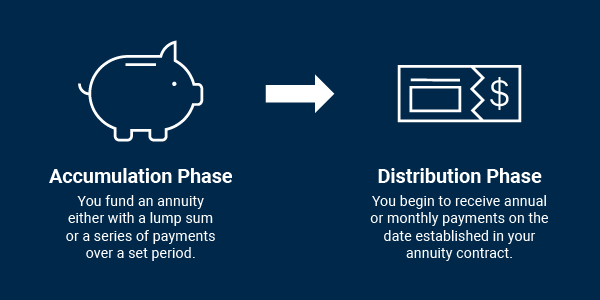Get answers to common questions about annuities, how they work and what type of annuity may be right for you.

Do you have enough savings to last throughout your retirement? It’s a common question — and concern — especially during periods of uncertainty. If you’re looking for a dependable income stream, annuities can be an important part of your retirement income strategy.
An Ameriprise financial advisor can help you decide if an annuity makes sense for you, your retirement needs and your overall financial goals. Here are answers to some of the most common questions about annuities and how they work:
What is an annuity?
An annuity is a long-term retirement investment product issued by an insurance company. It’s a common retirement tool because it can offer the following benefits to investors:
- Guaranteed income: Annuities can provide regular, guaranteed income for the rest of your life, for a set period, or provide a bridge to Social Security if you choose to retire early.
- Tax advantages: The money inside an annuity generally grows tax-deferred, meaning that any gains on the amount of premium invested won’t be taxed until the money is withdrawn.
- Protection from market volatility: Some annuity contracts offer guaranteed rates of return. While your rate of return on these annuities can be higher than the minimum, it will never go below the guaranteed rate, offering some protection from market volatility.
- Estate planning advantages: Most annuities offer a death benefit that will protect your original investment for your beneficiaries. Additionally, annuity contracts offer several options for survivor benefits.
What are the different types of annuities?
Though there are now a large variety of annuities available, most fall into one of two broad categories: immediate and deferred:
Immediate annuities
Immediate annuities are typically purchased with a single lump sum and generally start paying out a regular income stream within a year of purchase. You can choose from a variety of income options with immediate annuities, including some that provide income for your spouse or beneficiaries if you die prematurely.
Deferred annuities
Deferred annuities are typically designed to let you accumulate tax-deferred savings with the option to annuitize — converting all or part of the annuity into an income stream — for either a specific period or for as long as you live in retirement. There are several different types of deferred annuities, the most common of which include:
- Fixed annuities offer a fixed rate of return guaranteed to never fall below a certain minimum rate.
- Variable annuities offer growth potential from a choice of underlying investment options. They also provide a guaranteed death benefit for your beneficiaries.
- Structured annuities provide opportunities for growth and a level of protection that can help manage some of the risk that comes with investing.
- Fixed index annuities provide opportunities for growth based on the performance of certain market indexes while protecting your principal from losses.
How do deferred annuities work?
With a deferred annuity, you pay the annuity company premiums over a specified period (or in one lump sum). Then, in the future, the annuity company starts paying you. In general, annuities work through two different stages:
- Accumulation phase: During this period, you pay premiums into the annuity. Depending on the type of annuity, you can choose to pay over a specified period, with one lump sum or with add-on payments.
- Distribution phase: During this period — depending on the terms of the annuity contract — you receive monthly, quarterly or annual payments.

Variable annuity calculator
Use this calculator to see how a variable annuity could fit with your retirement income strategy.

How do annuities pay out income?
Different types of annuities have different payout options:
- Life payout: You will continue to receive payments until you pass away, but payments will not continue for your beneficiary.
- Period certain payout: You will receive payments for the period your contract specifies. If you pass away before the end of the period, your designated beneficiary will receive the payments until the end of the contract period.
- Joint-life payout: You will receive a lifetime payout for yourself and one other person, typically a spouse. Because a joint-life payout is likely to provide benefits for a longer period, the payout is typically lower than for annuities with a single-life payout.
- Life-with-period-certain payout: You will receive payments for the rest of your life, but if you pass away during a specified period, your beneficiary will receive payments only for the duration of that period.
Debunking common annuity myths
Clear up common misunderstandings about annuities and learn how they can be used to help you reach your financial goals.
When should I purchase an annuity?
Because there are so many options with annuities, buying an annuity will depend on a host of factors, including your age, life expectancy, needs and financial goals. Immediate annuities tend to make more sense for those who have already retired or are close to doing so because they typically pay out right away.
Deferred annuities may make sense if you have a longer time horizon (as your premiums will have more time to benefit from tax-deferred growth) and if you have already maxed out contributions to tax-advantaged retirement accounts like an IRA or 401(k).
How do I determine what type of annuity is right for me?
Given the variety of annuities available, talk to your financial advisor to determine which type of annuity may help you reach your financial goals. Among other things, you will want to consider:
- Timing of your first payout: When would you like to begin taking distributions? Do you want payments to start immediately or be deferred to the future?
- Your risk tolerance: Different annuities carry different amounts of risk. Do you feel more comfortable with a fixed interest rate on your principal investment or are you willing to accept more risk for a variable — possibly higher or lower — rate of return?
- Payout options: Do you want an annuity that guarantees payments for the rest of your life, one that pays out for a predetermined amount of time, such as 5 or 30 years, or some combination?
What else should I consider before purchasing an annuity?
- Costs: Annuities can come with higher costs than other retirement vehicles and expenses that can reduce the owner’s returns. Annuities are typically sold on commission, which can amount to anywhere from 1% to 10% of the total value of the contract.
- Surrender charges: If you’re considering a deferred annuity, understand the surrender period, which is the time you must wait until you can withdraw funds without facing a penalty. Known as a surrender fee, that penalty is typically a percentage of the withdrawal amount and usually declines over time.
- Complexity: Annuity contracts, including fees and expenses, can be complex to understand. As such, there are many misconceptions about how annuities work.
- Insurer history: When searching for an annuity provider, look for an insurance company with a long history of meeting its obligations to clients. You’ll want to ensure that the company that issues the annuity and backs the guarantees has a solid credit rating from independent rating agencies.
Are annuities taxable?
An annuity’s tax treatment is determined by the specific type of annuity you purchase – either qualified or non-qualified:
- Qualified annuities are purchased through a qualified retirement account, such as a traditional or Roth 401(k), which means your annuity is subject to the same tax rules that govern those accounts.
- Non-qualified annuities are not purchased through a qualified retirement account and therefore are funded with after-tax dollars. With non-qualified annuities, you only pay taxes on the earnings or interest portion of the distribution, but not the principal. However, like a qualified annuity (or any qualified account), non-qualified annuities are also subject to a penalty if withdrawals are taken before age 59½.
Learn more: Annuities and taxes
Is an annuity right for you?
An Ameriprise financial advisor can help you decide if an annuity makes sense for your situation, your retirement plan and your overall financial goals.
One of your clients has some questions they would like to discuss with you at your next meeting.
warning Something went wrong. Do you want to try reloading? Try again
When you’re ready to reach out to an Ameriprise financial advisor for a complimentary initial consultation, consider bringing these questions to your meeting.
Reach out to %advisor% to start the conversation.
Or, request an appointment online to speak with an advisor.
At Ameriprise, the financial advice we give each of our clients is personalized, based on your goals and no one else's.
If you know someone who could benefit from a conversation, please refer me.
Background and qualification information is available at FINRA's BrokerCheck website.
|
ARE NOT A DEPOSIT
|
ARE NOT FDIC INSURED
|
ARE NOT INSURED BY ANY FEDERAL GOVERNMENT AGENCY
|
ARE NOT BANK, CREDIT UNION OR SAVINGS & LOAN GUARANTEED
|
MAY LOSE VALUE |